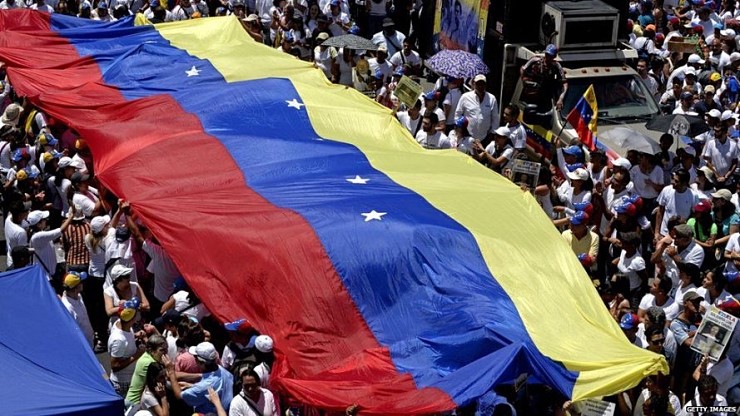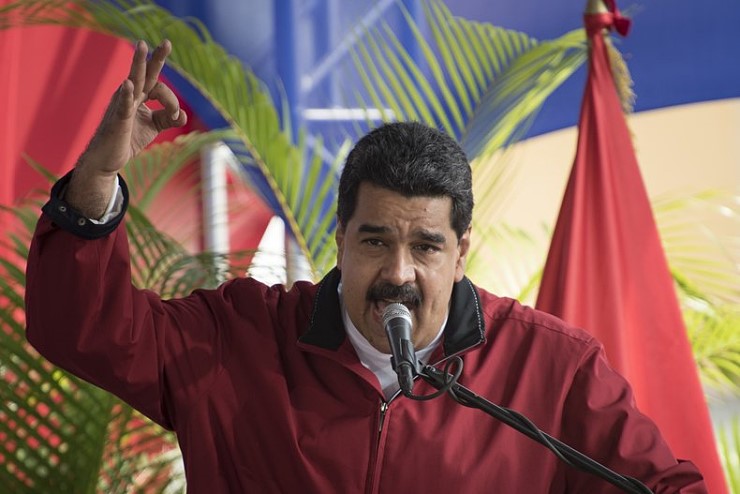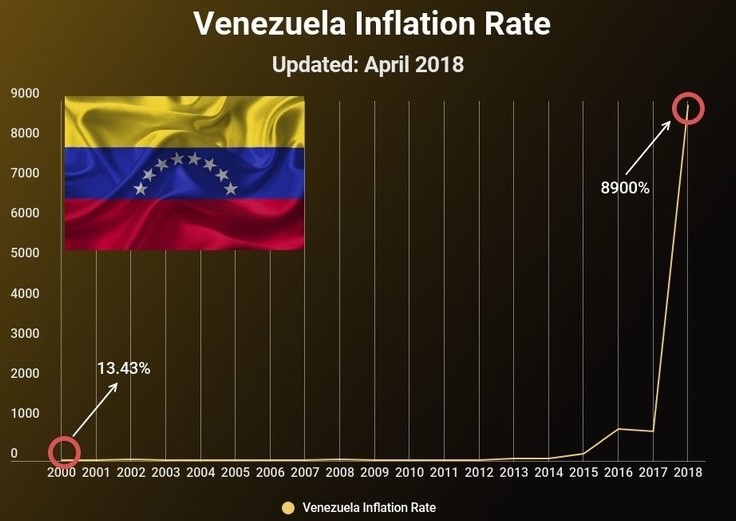Venezuela was once considered the most economically developed country in South America. Yet, now it is suffering from a severe economic crisis. When former president Hugo Chavez took over, he launched ambitious social programs such as Gran Misión that provided free medical care to the poor and it was funded by revenues from its abundant oil resources. The program also offered free housing to low-income people and covered the construction of 240,000 much needed new homes. It's common for countries to provide welfare to their citizens as people pay taxes, but the Venezuelan government had a lot of money from the proceeds of selling its oil, so it was able to do so without raising taxes. As a result, President Chavez won 60 percent of the vote and was able to succeed in maintaining his role as head of the country in four subsequent presidential terms. However as the global price of oil and gas plummeted and worldwide demand decreased, Venezuela started to feel the pinch from these new economic realities.
 |
| ▲ Venezuelans protesting in the wake of unending economic crisis. (Photo by: Techbullion) |
According to an interview conducted by The Dankook Herald with Professor David Kelleher of the International College who specializes in International Business at Dankook University, Chavez, who came to power in 1999 and stayed in office until his death from cancer in 2013 started the so-called “Bolivarian Revolution”. Venezuela’s political-economy was completely transformed as the country embraced socialism. As a result, it became ever-more dependent on the export revenues from their newly nationalized oil industry. In an article published by the Council on Foreign Relations, ‘Chavez expropriated millions of acres of land and nationalized hundreds of private businesses and foreign-owned assets, including oil projects run by ExxonMobil and ConocoPhillips.’ (Venezuela in Crisis, 2018-3-23) Many private sector businesses were taken over by the government and foreign investment was forced out of business in Venezuela. Besides big oil and gas companies like ExxonMobil, other foreign businesses such as General Motors and Hilton Hotels were also victims of government expropriation. Once a haven for development and growth through foreign investment, the country was soon devastated by the efforts of the government to keep the so-called imperialist forces out of Venezuela. Chavez effectively closed the nation’s doors to foreign investment just as Castro had done decades before in Cuba.
 |
| ▲ Nicolas Maduro, the current president of Venezuela. (Photo by: Fortune) |
While their intentions to help the country’s poorest were valid, the nation relied far too much on their natural resources to fund their ambitious social programs. More than 90 percent of the country’s exports are based on oil. When Iranian oil flooded the global market, the world price dropped from more than 100 dollars a barrel to about 60 to 70. In addition, improved technology in the US enabled the Americans to significantly increased domestic production curtailing their reliance on outside markets to feed their fuel consumption needs. This coupled with a huge decrease in overall global oil consumption, crippled Venezuela’s ability to sustain a level of income they require to support their spending programs. Without program cuts, spending restrictions, or tax hikes, Venezuela was failing to cope with their new economic realities, forcing the nation into certain doom.
Nevertheless, President Maduro, who took power when his mentor, former President Hugo Chavez passed away from cancer in 2013, never worried about his approval rating, so he didn't see the decline in oil prices as a problem for his government. As the appointed successor of Chavez, Maduro faced no difficulties in pushing the country further into the rampant economic crisis. He refused to curtail spending on government welfare policies and didn't raise taxes. While the government continued its reckless spending without having any money to pay for it, their debt inevitably increased.
Professor Kelleher pointed to the Venezuelan president’s lack of an effective policy needed to tackle the economic crisis as the primary cause of the nation’s massive demise. He told us that their government responded by simply printing more money to pay its debts. The increase in the supply of money in the market led to hyperinflation, where the prices of goods raised to unreasonable amounts. People now have to carry bags of money to make simple purchases. The government then attempted to revalue the bolivar, through the use of a crypto-currency called the “petro”. However, this too failed to address the underlying problem.
In September 2018, the IMF predicted that inflation in Venezuela would hit 1 million percent in 2018. The president of Venezuela responded by implementing a policy aimed at “Venezuelan Income-led growth”. Under this plan, the minimum wage was increased by 40% and corporate income taxes were also increased. However, in face of the severe hyperinflation this country is dealing with, a monthly wage increase of 40% has no impact on the purchasing power of ordinary Venezuelans.
Due to the economic crisis, food is scarce and supermarket shelves are always empty. Around 80% of citizens can barely afford to eat one meal per day and many people are looking for food anywhere they can find it, including trash cans. The average weight of Venezuelans in 2017 dropped by 11kg, as compared to 2016, when the average weight of people had already dropped by 6kg. A study conducted by three of Venezuela’s major universities also showed that 90% of Venezuelans ate less this year than they did over the same period last year.
Amid the escalating economic crisis in Venezuela, the people initiated what the media regarded as a mass exodus. Venezuelans are no longer able to live in their nearly depraved country and are choosing instead to flee to neighboring countries like Brazil, Colombia, Ecuador and Peru. In a recent article by Dany Bahar of the Brookings Institute the author states, “the economy has shrunk by more than 30 percent since the collapse of oil prices in 2014; the government has defaulted on its external debt; the exchange controls and price controls have destroyed the productive sector; the oil industry is collapsing and the purchasing power of Venezuelans has been completely wrecked by the rampant hyperinflation.” (Brookings, 2018-2-12). According to data released by United Nations, it is estimated that about 2.3 million people, or 7 percent of the country’s population have become economic refugees. Other parties place these estimates at over 4 million and the number continues to rise. Venezuelans have left the country in a search of better living conditions and more are leaving every day, as neighboring countries consider tightening their borders.
Recognizing that those fleeing Venezuela are doing so in desperation, 13 countries met in Quito for a two-day summit in September and pledged to help those entering their borders (while seeking international assistance to do so). But health problems and competition for low-wage jobs that accompany welcoming in mass amounts of refugees is sure to increase as their numbers continue to grow. Compared to the on-going Syrian Civil War, where more than 6 million refugees were relocated internationally, the crisis in Venezuela marks the second biggest refugee problem in the history of man-made disasters.
Violence has broken out along the borders of several countries connected to Venezuela. In Pacaraima, a northern town in Brazil, encampments of Venezuelan refugees were burned down by the local mobs. As the area is already impoverished enough as it is, resentment towards the refugees, fearing that they will only add to their current predicament, continues to rise. While the refugee situation keeps worsening, many people look to the United Nations and the United States to intervene and provide humanitarian aid. This, however, is further complicated as Maduro sees outsiders as ‘imperialist’ foes who would only offer aid to usurp his power. Venezuela is suffering the worst economic crisis in its history, heavily in debt, crippled by soaring inflation and importing far less as part of the president’s effort to conserve its dwindling central bank reserves. The IMF estimates that Venezuela has the world’s worst negative growth rate (-8%) coupled with the worst inflation rate (484%). They further estimate that the unemployment rate will climb from 17% to 30% in the coming few years.
 |
| ▲ Venezuela experienced 8,900 percent inflation in just 12 months. (Photo by: goldsilver) |
As Prof. Kelleher demonstrated, it is hard to draw any applicable lesson from the unique crisis in Venezuela. Inflation is the first problem that must be dealt with because it impacts everyone’s every day lives. However, faced with the crisis in price and supply of oil in global markets, this problem may take a longer time to solve than people ordinarily think.
Venezuela is indeed a very beautiful country with plenty of natural resources, a beautiful coastline and a climate that represents all conditions. Clearly, a leader must lead during the hardest of times. However, from Chavez to Maduro, these leaders wasted away the potential of the country and led it to complete economic ruin. Venezuela deserves more than just being a country rolling downhill with economic burdens and debts. What was once a paradise is now a man-made disaster.
Edward Ng, 박근후, Jane Shak dankookherald@gmail.com

![[Campus Magnifier] Let's Surf the Library!](/news/photo/202404/12496_1765_4143.jpg) [Campus Magnifier] Let's Surf the Library!
[Campus Magnifier] Let's Surf the Library!
![[Campus Magnifier] Let's Surf the Library!](/news/thumbnail/202404/12496_1765_4143_v150.jpg)





